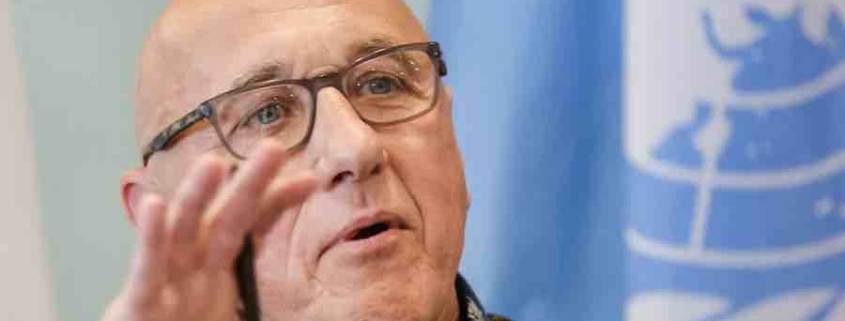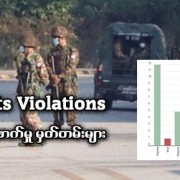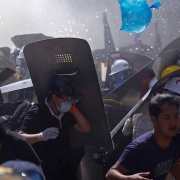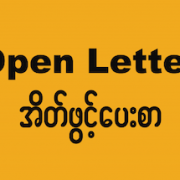UN rights expert urges bolder action by Indonesia, ASEAN against Myanmar junta’s violence
Speaking in Jakarta, Indonesia on Wednesday, a United Nations (UN) expert called on the Association of Southeast Asian Nations (ASEAN) to exert more pressure to end the Myanmar coup regime’s violence and human rights abuses.
ASEAN—a bloc of ten countries that includes Indonesia and Myanmar as members—initially treated the February 2021 military coup and violent crackdown on protestors in Myanmar as a crisis. The bloc convened an emergency meeting and reached a “five-point consensus” calling for an immediate end to violence, and dialogue between the military and its opponents.
In the intervening years, however, the coup regime has reneged on the terms of the consensus, and other ASEAN members have taken few actions to compel the regime to abide by them.
In his remarks in the Indonesian capital, Tom Andrews, the UN Special Rapporteur on the situation of human rights in Myanmar, underlined Indonesian President Joko Widodo’s previous observation that there had been little progress in realising the terms of the consensus due to the coup regime’s obstruction.
“President Widodo described the situation in Myanmar as ‘unacceptable’ and called for the military to end the use of force, release political prisoners, and restore democracy,” Andrews said.
Indonesia currently holds the rotating chairmanship of the regional bloc. Under Indonesia’s leadership, ASEAN was expected to take a harder line against the Myanmar junta than under the Cambodia’s chairmanship last year.
However, ASEAN members including Indonesia continue to allow Myanmar’s coup regime to represent Myanmar in most of the regional bloc’s dialogues, and have refrained from suspending its membership or divesting its authority to host conferences attended by the other members.
One such conference, known as the ASEAN Defence Ministers’ Meeting Plus (ADMM-Plus) Experts’ Working Group on Counter-Terrorism, will be hosted jointly by the Myanmar military regime and the government of the Russian Federation.
ADMM-Plus—which will be attended by defence ministry officials from all ASEAN member states as well as China, India, and Russia—is scheduled to convene two more times in 2023. Its purpose is to plan and carry out training exercises aimed at strengthening coordination among the member states’ military forces in responding to terrorist attacks.
The Myanmar military currently classifies groups that formed to oppose its seizure of power in 2021—including the publicly-mandated National Unity Government, the Committee Representing Pyidaungsu Hluttaw, and the People’s Defence Forces—as terrorist organisations.
Andrews condemned ASEAN’s legitimisation of the Myanmar coup regime and continued acquiescence in its role in the regional bloc, particularly in defence-related meetings.
“ASEAN defends this by claiming that these meetings are merely technical and are not in breach
of its prohibition on Myanmar political level participation in its meetings,” he said. “This is not acceptable. The junta should not be invited to attend any ASEAN meeting. At a minimum, ASEAN must not allow Myanmar military personnel to participate in these or any other defence meetings.”
Andrews emphasised that it was Indonesian officials’ initiative that spurred other ASEAN members to meet in Jakarta two months after the 2021 coup and draft the five-point consensus in order to hold the junta to account.
“Indonesia should show leadership, alongside other ASEAN countries and not attend if the
invitations to the junta military personnel are not rescinded. These types of actions not only undermine the credibility of ASEAN but also serve to legitimise the junta and prolong the suffering of the Myanmar people,” he added.
Andrews recommended other actions that Indonesia, as current ASEAN chair, can carry out in order to help bring Myanmar’s humanitarian crises closer to a resolution.
Among the recommended actions were working directly with humanitarian and civil society organisations, instead of the junta, in delivering emergency aid to the victims of Cyclone Mocha, and continuing to support programs and initiatives to help Myanmar’s Rohingya refugees.
“Our current course of action in response to the crisis in Myanmar is simply not working and a change of course is imperative,” he said. “This change will require vision and leadership, and I believe that Indonesia is positioned to provide that leadership and help forge a path forward to end the nightmare that life has become for millions in Myanmar.”







